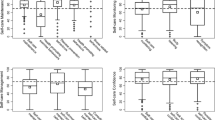Abstract
This study aims to predict adherence to diabetic treatment regimens and sustained diabetic control. During two clinic visits that were 2 months apart, 63 adult outpatients completed measures of diabetic history, current treatment, diabetic control, adherence, and self-efficacy about adherence to treatment. Results showed that self-efficacy was a significant predictor of later adherence to diabetes treatment even after past levels of adherence were taken into account. Posttest levels of adherence in turn were significantly associated with posttest %HbA1c after control for illness severity. A stepwise multiple regression to predict %HbA1c at post entered pretest measures of diabetic control, treatment type, and self-efficacy, which together predicted 50% of the variance. Results are related to self-efficacy theory and implications for practice are discussed.
Similar content being viewed by others
References
Bandura, A. (1977). Self-efficacy: Toward a unifying theory of behavioral change.Psychol. Rev. 84: 191–215.
Bandura, A. (1982). Self-efficacy mechanism in human agency.Am. Psychol. 37: 122–147.
Bandura, A. (1991). Personal communication to D. Kavanagh, March 13.
Borkovec, T. D. (1978). Self-efficacy: Cause or reflection of behavioral change?Behav. Res. Ther. 1: 163–170.
Bradley, C. (1985). Psychological aspects of diabetes. In Alberti, K. G., and Krall, I. P. (Eds.),The Diabetes Annual/1, Elsevier, Britain.
Bradley, C., and Marteau, T. M. (1986). Towards an integration of psychological and medical perspectives of diabetes management. In Alberti, K. G., and Krall, I. P. (Eds.),The Diabetes Annual/2, Elsevier, Britain.
Condiotte, M. M., and Lichtenstein, E. (1981). Self-efficacy and smoking cessation programs.J. Consult. Clin. Psychol. 45: 648–658.
DiNicola, D. D., and DiMatteo, M. R. (1984). Practitioners, patients and compliance: A social psychological perspective. In Baum, A., Taylor, S. E., and Singer, J. E. (Eds.),Handbook of Psychology and Health, Lawrence Erlbaum, Hillsdale, NJ.
Epstein, L. H., and Cluss, P. A. (1982). A behavioral medicine perspective on adherence to long term medical regimens.J. Consult. Clin. Psychol. 50: 993–1003.
Glasgow, R. E., and McCaul, K. D. (1982). Psychological issues in diabetes: A different approach.Diabetes Care 5: 645–646.
Glasgow, R. E., McCaul, K. D., and Schaefer, L. C. (1987). Self care behaviors and glycemic control in Type I diabetes.J. Chron. Dis. 40: 399–412.
Goldstein, D. E., Parker, K. M., England, J. D., Weidmeyer, J. E., Rawlings, S. S., Hess, R., Little, R. R., Simonds, J. F., and Breyfogle, R. P. (1982). Clinical application of glycosylated haemoglobin measurements.Diabetes 31: 70–78.
Kavanagh, D. J., Pierce, J. P., Lo, S. K., and Shelley, J. (1993). Self-efficacy and social support as predictors of smoking after a quit attempt.Psychol. Health, 8, 231–242.
Kavanagh, D. J., and Wilson, P. H. (1989). Prediction of response to cognitive therapy for depression.Behav. Res. Ther. 27: 333–343.
McCaul, K. D., Glasgow, R. E., and Schaefer, L. C. (1987). Diabetes regimen behaviors predicting adherence.Med. Care 25: 868–881.
O'Leary, A. (1985). Self-efficacy and health.Behav. Res. Ther. 23: 437–451.
Sitharthan, T., and Kavanagh, D. J. (1990). Role of self-efficacy in predicting outcomes from a program for controlled drinking.Drug Alcohol Depend. 27: 87–94.
Toobert, D. J., and Glasgow, R. E. (1991). Problem solving and diabetes self care.J. Behav. Med. 14: 71–86.
Wood, R. E., and Bandura, A. (1989). Impact of conceptions of ability on self-regulatory mechanisms and complex decision making.J. Personal. Soc. Psychol. 56: 407–415.
Yusaf, S., and Kavanagh, D. J. (1990). The role of self-efficacy in the treatment of depression.J. Cognit. Psychother. 4: 51–70.
Author information
Authors and Affiliations
Additional information
This research was conducted as partial fulfillment of the requirements for a Bachelor of Arts degree by the second author. Dr Wilson was then with the University of Sydney.
Rights and permissions
About this article
Cite this article
Kavanagh, D.J., Gooley, S. & Wilson, P.H. Prediction of adherence and control in diabetes. J Behav Med 16, 509–522 (1993). https://doi.org/10.1007/BF00844820
Accepted:
Issue Date:
DOI: https://doi.org/10.1007/BF00844820



